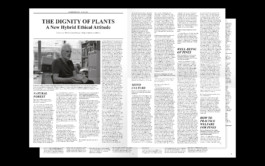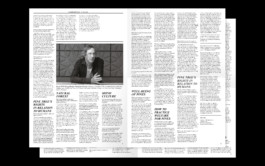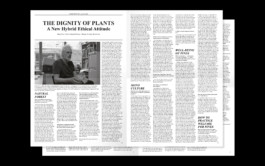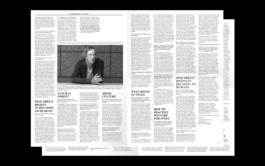




"It would be very much helpful if we could actually see that plants also have the “rights” to be here and that nature should remain in some state of well-being, and that we are actually threatening that well-being. So I think that would be the link."
Dr Jan den Ouden
"Don’t disturb the soil too much. Don’t add too many fertilisers. Don’t use herbicides, fungicides, or insecticides. That’s the best advice much more than giving advice about what we should do. It’s more about refraining than doing things."
Thomas Kuijper
Interviewees
Department of Environmental Sciences
Forest Ecology and Forest Management
Wageningen University, NL
Department of Environmental Sciences
Soil Quality
Wageningen University, NL
The core of this research, ‘The dignity of plants’, is inspired by the ethical discussion on the legislative context by the Swiss Federal Ethics Committee on Non-Human Biotechnology (ECNH, 2008). In order to investigate how the concept of plant rights could relate to the design industry, I focused on monoculture by choosing pine – the most common timber used for production by IKEA – as a case study. Modern forestry is largely based on monocultures. However, monoculture is known to be detrimental to the environment as it destroys the biodiversity and disturbs the ecosystem. Unlike general opinions of monocultures, the conclusion of such pine study contradicts our ethical values, making them vulnerable. Sometimes abiding with a monoculture is perfectly in line with the aim to favour sustainable, natural processes. Seemingly sound intuitions are all too often based on false sentiments and prejudices.
2018
Digital print
42 x 59.4 cm, 4pp
Graphic design by Suk Go


The core of this research, ‘The dignity of plants’, is inspired by the ethical discussion on the legislative context by the Swiss Federal Ethics Committee on Non-Human Biotechnology (ECNH, 2008). In order to investigate how the concept of plant rights could relate to the design industry, I focused on monoculture by choosing pine – the most common timber used for production by IKEA – as a case study. Modern forestry is largely based on monocultures. However, monoculture is known to be detrimental to the environment as it destroys the biodiversity and disturbs the ecosystem. Unlike general opinions of monocultures, the conclusion of such pine study contradicts our ethical values, making them vulnerable.
Interviewers
Prof. dr. ir. J (Jan) den Ouden
Wageningen University, NL
Department of Environmental Sciences
Forest Ecology and Forest Management
Prof. dr. TWM (Thomas) Kuijper
Wageningen University, NL
Department of Environmental Sciences
Sub-department of Soil Quality
2018, Digital print, 42 x 59.4 cm, 4pp
Graphic by Suk Go
© Minji Choi 2024